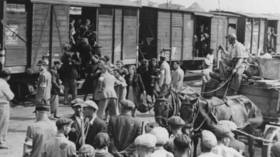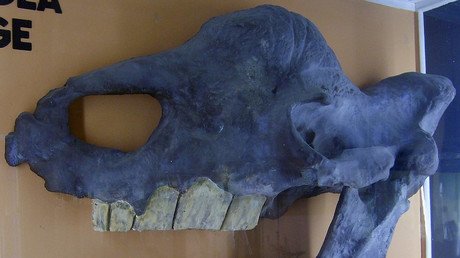Ukraine depicts Soviet reprisals of Crimean Tatars with photo from... Jewish WWII ghetto

Ukraine’s US Embassy seems to have gone overboard on scaremongering Russia as it tried to pass off a photo of Jewish Holocaust victims as Crimean Tatars that were being deported by the Soviet Union during WWII.
Kiev’s diplomatic mission took to Twitter on the anniversary of the 1944 deportation uploading a black-and-white photo of multiple people being forced into a wooden boxcar. The emotive picture was obviously to show how cruel the Soviets were towards Crimean Tatars at the time.
May 18, 1944, it was a day when we couldn’t stop Stalin. As a consequence, we mourn the victims of the #CrimeanTatars deportationSince 2014 Russia has targeted Crimean Tatars w/ detentions, forcing them out of Crimea. And it’s our duty now do not allow a bitter history repeats. pic.twitter.com/NQc36SCiZ5
— UKR Embassy in USA (@UKRintheUSA) May 18, 2019
The Embassy proclaimed that it was “our duty” not to allow the repetition of “a bitter history.” But it turns out that history per se – or doing proper research, at the very least – isn’t the strongest suit of Ukrainian diplomats.
The photo they used has nothing to do at all with the wartime displacement of Crimean Tatars by Soviet authorities. It was in fact taken at a Jewish ghetto in Lodz, Poland, and the people filmed in and outside the wagon were the ones who perished in one of the Nazi death camps.
The Russian Embassy in the US was apparently the first to spot the offbeat blunder. In doing so, they checked the Ukrainian tweet against an official publication by the American Holocaust Memorial Museum.
Ukrainian diplomacy playbook:🔹“1944 #CrimeanTatars deportation” is @HolocaustMuseum picture of the Lodz🇵🇱 ghetto Jews🔹“2019” - arrest of suspected foreign terrorist organization members https://t.co/64uoHUKgKQReality: memorial ceremony in #Crimea🇷🇺▪️https://t.co/0saGnKxQKtpic.twitter.com/OtwChzyerq
— Russia in USA 🇷🇺 (@RusEmbUSA) May 20, 2019
To make matters worse, the Ukrainian embassy’s publication made another appeal to their audience which raises more than a few eyebrows. “It was a day when we couldn’t stop Stalin,” the Embassy wrote while publishing the infamous photo.
The “we” part looks especially odd given that stopping the Soviets at final stages of World War II meant fighting in or alongside Nazi forces.
The story was met with little praise in Crimea. Seitumer Nimetullaev, leader of a local Crimean Tatar NGO, bemoaned the “unacceptable historical error that was likely made unintentionally.” Nevertheless, he urged Ukraine’s embassy “to become more competent in history issues, especially when it comes to tragedies of entire peoples.”
Russia, for its part, has never disavowed the 1944 deportation, in which Crimean Tatars were forcibly relocated to Soviet Central Asia en masse by Joseph Stalin after it emerged that some of them collaborated with the Nazis. They began to return to Crimea after the war, but many faced bitter land disputes struggled with a lack of political representation.
Shortly after Crimea chose to cede from Ukraine and join Russia, President Vladimir Putin signed a decree officially rehabilitating Tatars and other ethnic minorities on the peninsula. May 18 is celebrated each year to pay tribute to people deported during the war.
It isn’t the first time images of the notorious Lodz ghetto became the source of a humiliating gaffe in Ukraine. Two years ago, former President Petro Poroshenko landed himself in hot water when he tried to illustrate the 1947 displacement of Western Ukrainians to Siberia by publishing a photograph again showing the Jewish ghetto. The president’s office quietly deleted the post, but not until it was relentlessly mocked online.
Also on rt.com Ukrainian president quietly deletes tweet & FB post wrongfully featuring Holocaust imageSubscribe to RT newsletter to get stories the mainstream media won’t tell you.














